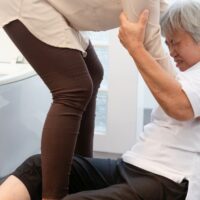Who is Liable After a Nursing Home Fall?

Every year, thousands of residents of nursing homes and long-term care facilities are injured in accidental falls. Slips, trips, and falls can be dangerous at the best of times, but for elderly and disabled individuals, they are even worse: Nursing home residents can shatter their hips, break wrists, or suffer traumatic head and brain injury. The Centers for Disease Control and Prevention (CDC) estimates that 1,800 nursing home residents die each year in fatal falls, while thousands of others suffer debilitating injuries. When an elderly resident at a nursing home falls, who is to blame? Whom can you hold accountable? Continue reading for a discussion about nursing home falls and reach out to a seasoned New Jersey nursing home neglect lawyer for more information.
What causes a nursing home fall?
Before deciding who is responsible for a fall, it is important first to identify the cause of nursing home falls. According to the CDC, while muscle weakness and gait problems are contributing factors to many nursing home falls, environmental hazards in nursing homes cause 16 to 27 percent of falls among residents. These hazards include things like wet floors, poor lighting, incorrect bed height, and improperly fitted or poorly maintained wheelchairs. Falls may be caused by difficulty walking, exacerbated by poorly fitted shoes, poor foot care, and improper use of walking aids.
The CDC also notes that medications can increase the risk of falls and fall-related injuries. Medications can have side-effects affecting balance and clarity, and when a patient changes from one medication regimen to another, they often experience extremely elevated side effects for the next few days.
Whose fault is it?
Liability for a nursing home fall depends in part on the cause of the fall. As discussed above, if a fall is caused by a nursing home hazard such as a wet floor, then anyone involved in maintaining the premises is potentially liable: the nursing home, the building owner (if different from the nursing facility), and even contractors responsible for maintenance and cleaning may be partially responsible. If a fall happens due to a poorly designed medical device such as a bad wheelchair, the medical device manufacturer may also be partially liable.
Many of the fall causes noted above are preventable or at least can be mitigated by proper care in the nursing home. Properly trained nursing home staff know to check patients’ shoes for proper fitting, check their feet for sores, sprains and breaks, and keep a close eye on patients when they switch medications. If a fall happens as a result of something that a nurse or other facility staff member should have been able to prevent with proper care and attention, then the nursing home may be liable for negligent care. Moreover, nursing facilities should be taking measures to prevent fall risks at all times, such as by prescribing exercise regimes, keeping patients active, providing vitamin D supplements, and providing residents with safety equipment to reduce fall damage (such as hip pads). If they fail to take these safety measures and your elderly loved one is injured as a result, you and your family may have a claim for damages. Contact a nursing home negligence and abuse attorney to investigate the circumstances of the injury and determine whether the fall would have been preventable, or the damage less severe, had the nursing home been operating properly.
Help is Available to Stop and Prevent New Jersey Nursing Home Negligence
If you or someone you love has been subjected to negligence or abuse in a New Jersey nursing home, contact the seasoned and passionate Hamilton nursing home negligence attorneys at Lance Brown & Associates at 609-587-5100.